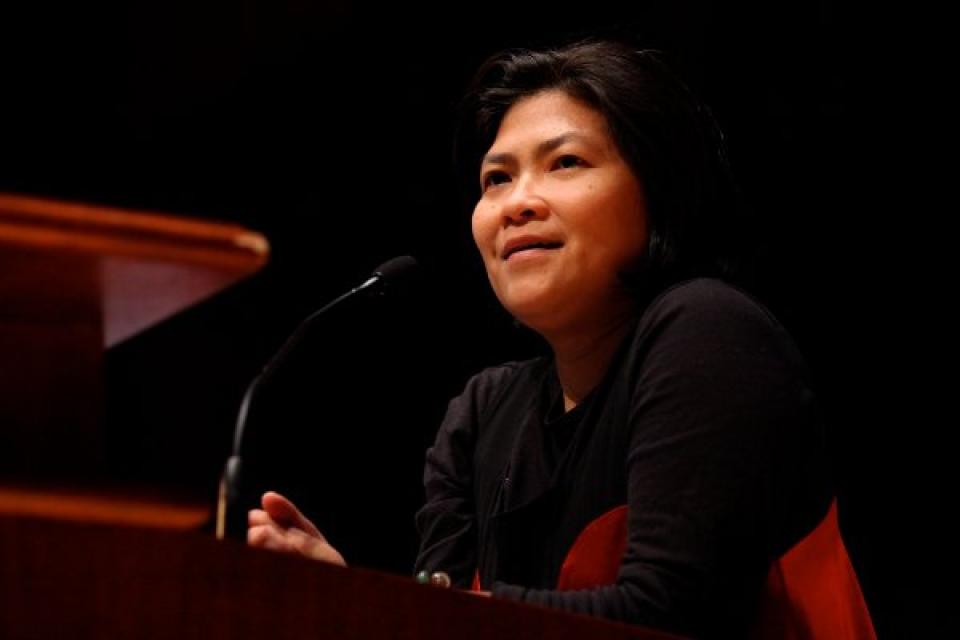
Mavic Cabrera-Balleza (MCB): Hi Jane, I’m delighted to see you again. Thank you for agreeing to do this interview for GenderIt. I’m familiar with the work of the Women Human Rights Defenders International Coalition and I would like to request you to share your very interesting work with the coalition.
Mary Jane Real (MJR): I coordinated the Women Human Rights Defenders International Coalition (WHRD IC). The WHRD IC is a resource and advocacy network for the protection and support of women human rights defenders worldwide.
It is an international initiative created out of the international campaign on women human rights defenders launched in 2005. It draws attention to the recognition of women human rights defenders; and asserts that those advocating for women's human rights - no matter what gender or sexual orientation they claim - are in fact human rights defenders. Their gender or the nature of their work has made them the subject of attacks, requiring gender-sensitive mechanisms for their protection and support.
The Coalition involves women activists as well as men who defend women's rights and lesbian, gay, bi-sexual, and transgender (LGBT) defenders and groups committed to the advancement of women's human rights and sexual rights. I have been part of the initiative when it started as an international campaign in 2005 and became its coordinator when it was constituted as a Coalition in 2008.
MCB: Please describe how women human rights defenders use the internet and other information and communication technologies (ICTs) such as mobile phones in their work. Have they increased your capacity to organize and mobilize? Could you please cite some examples?
MJR: ICTs are a major component of social mobilization in the 21st century and in general, women human rights defenders have taken advantage of this. For example, the Coalition circulates urgent appeals from women human rights defenders at risk online. The use of ICTs has made it possible for members of the Coalition to respond to these appeals immediately.
In many instances, the immediate responses have successfully pressured national governments and other actors to take action for the protection of women human rights defenders. For example, as a result of the appeals sent by members of the Coalition to the government of Azerbaijan, in 2009, the Ministry of Interior dropped the charges against Leyla Yunusova for violating Article 10 of the Law on the Media, and libel under Article 23 of the Civil Code. The charges were filed against Leyla in relation to her activism of exposing the involvement of the police and other government officials in the kidnapping of children for trafficking in the country.
The Coalition maintains a listserve, website, and uses email, skype and mobile phones to communicate with its members, conduct on-line meetings and update its constituencies. With an international mandate and membership in different countries, ICTs has made it possible for the Coalition to function at reasonable costs.
ICTs have also extended the Coalition’s outreach to a broader network of constituencies, which has led to the expansion of its membership, with 25 international, regional and national women’s rights, human rights and sexual rights organisations to date.
MCB: How else have the internet, mobile phones and other forms of new information and communication technologies (ICTs) changed the way women human rights activists conduct their organizing work, networking and advocacy?
MJR: ICTs have also facilitated advocacy on the concerns of women human rights defenders. For example, in 2008, the Coalition conducted a study to identify the needs for protection and support of women human rights defenders worldwide to inform its advocacy agenda. The study was conducted through an on-line survey that brought responses from women human rights defenders in different countries, including ‘unorganised’ defenders or those that are not part of formal organizations and networks.
MCB: Has the use of the internet, mobile phones and other forms of new information and communication technologies (ICTs) impacted on the lives of women human rights defenders in ways that are different from other people?
MJR: This is a gender concern that the Coalition has not looked into systematically, but should be examined seriously. While there are studies about the impact on ICTs on women in general, I am not aware of studies specific to the impact of ICTs on women human rights defenders. It would be interesting to find out and document the ways gender disparities on the use of ICTs particularly affect the activism of women human rights defenders.
MCB: What issues affect the ability of women human rights defenders to use internet and mobile phones effectively to mobilize around women's rights?
MJR: Given that knowledge of ICTs is still dominated by men, one of the main obstacles for women human rights defenders is the lack of skills to access and maximise the use of different forms of ICTs.
While a large number are well versed in the use of mobile phones, emails and certain forms of social media, the gender socialisation of women to be less interested in technology has resulted in a knowledge lag with less women acquiring technical expertise of ICTs. As a result, women human rights defenders in general have depended on their male colleagues to navigate other more complicated or less familiar forms of ICTs, limiting their ability to fully harness these technologies for social mobilisation and organising.
Cultural restrictions on women’s movement, lack of economic means, among other factors have also translated into women human rights defenders being devoid of access to ICTs, with many of them still unable to connect to networks and other forms of support for their protection.
MCB: I understand that women human rights defenders face risks all the time because of their work. Are there similar security risks when women human rights defenders use ICTs? What strategies and mechanisms are used to ensure their online safety?
MJR: The lack of access to ICTs and their lack of knowledge and skills to navigate these new technologies have direct security implications for women human rights defenders. Women human rights defenders who do not have on-line access, also do not have access to resources for their security and protection facilitated through ICTs. They are unable to avail of existing immediate, on-line support provided by Coalition members and many other organisations for defenders at risk such as urgent appeals or different forms of emergency assistance such as immediate financial aid for security needs, speedy facilitation of temporary relocation abroad, and others.
For those who have access, the majority of them have not refined their knowledge and use of ICTs to be mindful of the security risks related to openly communicating through the internet and using computers. Many of them do not know how to store digital files securely, encrypt sensitive information transmitted through emails, or check their secure exposure as they depend on mobile phones for daily communication. For example, when one of the women human rights defenders’ phone was grabbed from her by unknown assailants, colleagues included in her phone’s contact list began receiving threats from alleged members of government intelligence forces in the Philippines.
Women human rights defenders have availed of digital security trainings given by several human rights and ICT organizations that have provided useful information on more secure use of the internet. Usually one-off, the trainings are unable to build the capacity of women human rights defenders to gain control of their own use of ICTs and take steps to address their own digital security needs. The trainings have been unable to address the fundamental gender disparities that account for women’s lack of access and lack of knowledge and skills on ICTs.
MCB: What legal and policy instruments/mechanisms are in place to address, prevent and eliminate security threats against human rights defenders?
MJR: The UN Declaration on Human Rights Defenders affirms the activists’ rights to work in a secure environment. The UN Special Rapporteur on Human Rights Defenders monitors the implementation of the Declaration. At the national level, some independent national human rights commissions have been receptive in implementing provisions of the UN Declaration including constitutional or legal provisions on freedom of expression, but governments have yet to adopt laws and policies that specifically ensure the rights of human rights defenders to be safe and secure, including against on-line threats and arbitrary restrictions on the use of internet and ICTs.
MCB: What do you perceive as the concrete next steps to be undertaken in order to increase security and support freedoms of association and expression of women human rights defenders, online and offline?
MJR: One of the concrete steps is to form the on-line network for women human rights defenders using ICTs in their activism. This is critical for their protection and security, on line and off line. The network would link women human rights defenders to ICT experts either among themselves or from organisations like APC that could facilitate their learning and close the gender gap in knowledge and skills on ICTs.
The network would also provide a system of support for women human rights defenders: it could provide on-line tutorials and technical assistance about their digital security concerns such as providing advice on queries regarding how to address hacking, on-line surveillance, etc. It could also facilitate offline solidarity and support for women human rights defenders at risk such as mobilising responses to urgent appeals; linking them to sources of emergency funds; and other forms of support.
The cross-country cross-cultural exchange would also help break the gender stereotypes and cultural restrictions to women’s rights and build towards ending their dependency on men or others to address their digital security needs.
MCB: Jane, thank you for your time and for sharing your views.
MJR: My pleasure.
This article was written as a part of APC's “Connect your rights: Internet rights are human rights” campaign financed by the Swedish International Development Cooperation Agency (Sida)
- 9927 views






Add new comment